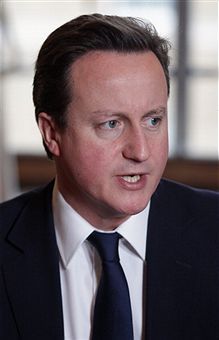 Of all the broadcast hours devoted to the Big Society, only one discussion has made me
think that the whole thing is not completely doomed. Channel4’s 10 O’Clock Live show, staged last Thursday. It’s up on YouTube now (34 mins in).
Of all the broadcast hours devoted to the Big Society, only one discussion has made me
think that the whole thing is not completely doomed. Channel4’s 10 O’Clock Live show, staged last Thursday. It’s up on YouTube now (34 mins in).
The comedian David Mitchell kicked off. “The clearest thing anyone can say about Big Society is that it’s the opposite of Big Government,” he said. Now, I haven’t heard
anyone not paid by the Conservative Party say anything as clear (or as positive) about the BS. But, then again, neither Phillip Blond (who has built a think tank from the success of his Red Tory
theme) nor Shaun Bailey (the unsuccessful Tory candidate in Hammersmith) is paid by the Tories. And perhaps that’s what helped them make an oddly compelling case.
When Ian Birrell tweeted that he’d been asked on but couldn’t make it, I smiled to myself: he’d dodged a bullet. Were he in Coulson’s job, he’d have no choice but to
go on. I suspected it would be a lynching. For the prosecution was Johann Hari, an eloquent and impassioned critic. His theme: Cameron’s ‘Big Society’ is a ruse to cover the cuts.
Who wants to do a whip-round for a forest? The audience laughs, and it looks like the standard Tory-baiting. Then Hari produced one of his trademark obscure studies: an American academic who found
a direct link between volunteering and state spending. Cameron is cutting money to charities, so QED. (Unable to find such a study in anything other than Hari’s articles, we contacted the
academic he mentioned, Amitai Etzioni. He said he’d never heard of it. But you have to give Hari marks for chutzpah.) The idea that volunteering is dependent on state funding is odd, but one
Cameron reinforces with his Big Society bank. So, little wonder Hari’s attack resonates.
Then Bailey spoke. “You’re speaking about volunteering like it’s the whole thing,” he said. Three quarters of charities in Britain get no funding, but they’ve been
doing the job all along. People volunteer all the time, he said, they don’t need state funding to do so. He added: “I do think that politicians don’t know what they’re
doing and I’d rather look after my goings on.” For him, the BS is “about getting us a little bit more involved in what we do. You have umpteen different councillors or politicians
telling you what to do, but do they really know what you want?”
Phillip Blond talked first principles: state monopoly provision of public services has been a disaster for those dependent on them. “All Johann is defending is a settlement that’s
failed. We’ve spent billions and billions on the poor, and we still have poverty… The settlement that Johann is defending was hell for the poor.” He mentioned Charlie Elphicke, who – as
James observed last summer – is mutualising the Port of Dover.
“You are in favour of massive cuts!” Hari retorted. Wrong, said Blond, he’s never defended them – and in fact attacked them in The Independent. Does Hari read his own paper?
“Shaun is in favour of massive cuts!” Hari said, turning to Bailey. No dice. Hari said: “The idea is that when you massively cut back the state, volunteers will step in to defend
it.” No, said Bailey and Blond, that’s not the argument at all.
Bailey elaborated. “We inherited a crock. It doesn’t matter what party you’re from. I don’t love Conservative politics more than I love the people I try to represent, and
that’s the poor people I’m involved with. We inherited a crock. All I’m saying about the Big Society is that it’s a chance to get involved and take charge. If you don’t like how your
situation is run, at least it’s a way to complain about it. For me, when you approach the council, they’re so set, they’re so hard. There’s no route to assault them by. All I want
is the opportunity to say is that you are a pile of… and we would like to take charge. And the more we do it, the more people have the capability to do it.”
The Big Society is very hard to define, but Bailey and Blond did as good as job as I’ve heard. It’s essentially a very good idea, albeit convincingly disguised as a bad one.
PS: Phillip Blond tweets that the debate “made Frasier believe in the Big Society”. I wouldn’t quite put it quite like that! It’s the first time I’ve thought the whole debate might not be an abject humiliation for Cameron. I do have my own thoughts on BS – and how it’s a spivvy-sounding name for the eternal Conservative mission – but I’ll keep them for another post.







Comments